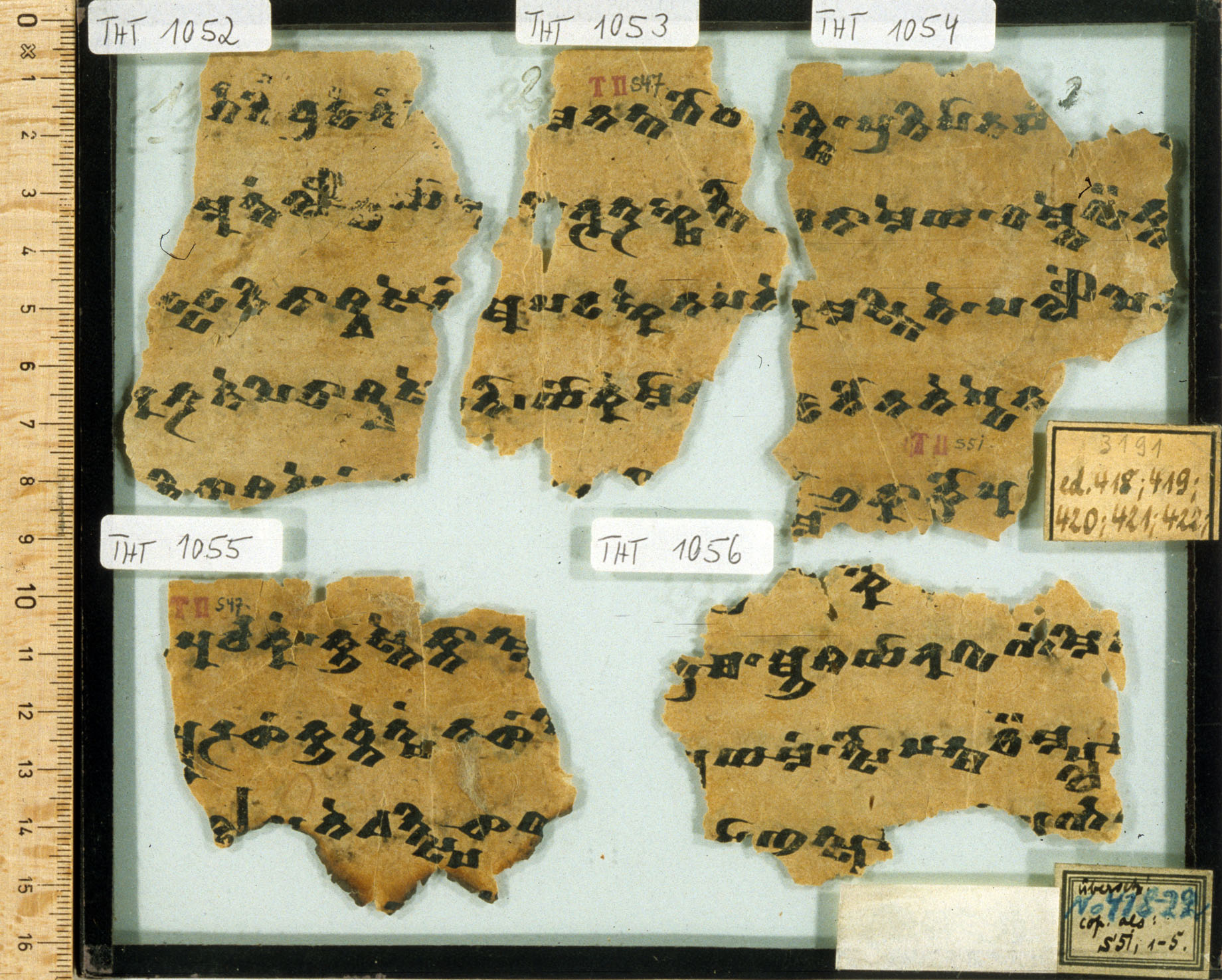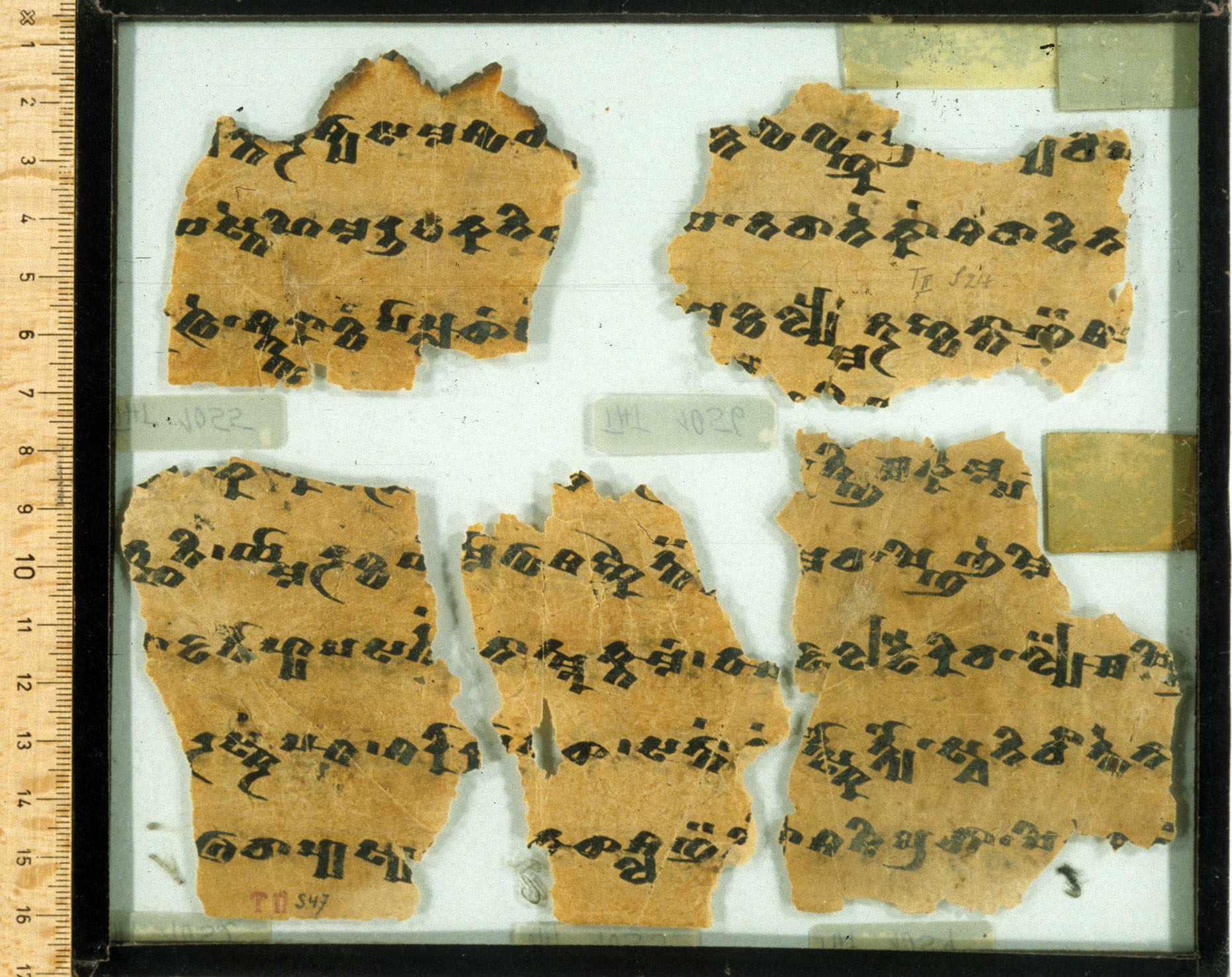A 421
| Known as: | A 421; THT 1055 |
|---|---|
| Cite this page as: | Gerd Carling; Angelo Mascheroni. "A 421". In A Comprehensive Edition of Tocharian Manuscripts (CEToM). Created and maintained by Melanie Malzahn, Martin Braun, Hannes A. Fellner, and Bernhard Koller. https://cetom.univie.ac.at/?m-a421 (accessed 05 May 2024). |
Edition | |
| Editor: | Gerd Carling; Angelo Mascheroni |
Provenience | |
| Main find spot: | Sengim |
| Expedition code: | T II S 51.4 |
| Collection: | Berlin Turfan Collection |
Language and Script | |
| Language: | Skt.; TA |
| Script: | late |
Text contents | |
| Text genre: | Literary |
Object | |
| Manuscript: | A 418-426 |
| Material: | ink on paper |
| Form: | Poṭhī |
| Number of lines: | 5 |
Images
Transliteration
| a1 | /// pu rva kaṃ • ku sne knā nmu /// |
|---|---|
| a2 | /// plu ra¯ ¯s̝ ku cne tṣaṃ na¯ ¯s̝ ·i /// |
| a3 | /// l· [s]· ne e ntsṣi¯ ¯s̝ ta /// |
| a4 | /// |
| a5 | /// |
| b1 | /// |
| b2 | /// |
| b3 | /// kt· [d]ṛ śyā sa ma śu bha /// |
| b4 | /// ya ste hi ma ru ca ka ni /// |
| b5 | /// khe • śtwa rā¯ ¯k pā pl·¯ ¯s̝ /// |
Transcription
| a1 | n1 /// purvakaṃ • kus ne knānmu(ne) /// |
|---|---|
| a2 | n2 /// (pā)pluräṣ kuc ne tṣaṃ naṣ ·i /// |
| a3 | n3 /// l· s·ne entsṣiṣ tä /// |
| a4 | /// |
| a5 | /// |
| b1 | /// |
| b2 | /// |
| b3 | /// kt· dṛśyāsamaśubha /// |
| b4 | /// yas te himarucakani /// |
| b5 | /// khe • śtwarāk pāpl(u)ṣ /// |
Translation
| a1 | Sanskrit ... The one who (attained?) knowledge ... |
|---|---|
| a2 | ... having praised... (?) ... |
| a3 | ... |
| a4 | ... |
| a5 | ... |
| b1 | ... |
| b2 | ... |
| b3 | Sanskrit |
| b4 | Sanskrit |
| b5 | Sanskrit. Forty ... praised ... |
Commentary
Philological commentary
| n1 | For the restoration knānmu(ne), see a similar passage in YQ I.1 a7(1.8) yomäs kus ne knānmune. |
|---|---|
| n2 | The form (pā)pluräṣ was already proposed by Sieg and Siegling 1921: 232, see also Carling and Pinault 2023: 281 s.v. pälā-. |
| n3 | The form entsṣiṣ is a hapax of undetermined meaning. It can be analysed as a Subj. IX Opt., 3.sg., probably from a causative stem of eMts- ´seize, grasp, take for oneself´, see TEB I: 46 and Malzahn 2010: 538-539; a different interpretation is provided by Peyrot 2013: 725. |
Remarks
| Transcription and references have been transferred from the "Text and Reference Database of the Tocharian A Language" (Gerd Carling Lund University) (funded by the Bank of Sweden Tercentenary Foundation and SCAS). | |
| Transcription and translation are based on Carling et al. 2009. |
References
Online access
IDP: THT 1055; TITUS: THT 1055
Edition
Sieg and Siegling 1921: 232; Sieg and Siegling 1921 p. 232
Bibliography
Carling, Gerd, and Georges-Jean Pinault. 2023. Dictionary and thesaurus of Tocharian A. Wiesbaden: Harrassowitz.
Carling, Gerd, Georges-Jean Pinault, and Werner Winter. 2009. A dictionary and thesaurus of Tocharian A. Volume 1: Letters a-j. Wiesbaden: Harrassowitz.
“The International Dunhuang Project: The Silk Road Online.” n.d. http://idp.bl.uk.
Malzahn, Melanie. 2010. The Tocharian verbal system. Leiden/Boston: Brill.
Peyrot, Michaël. 2013. “Die tocharische Daśakarmapathāvadānamālā.” In Die Erforschung des Tocharischen und die alttürkische Maitrisimit, edited by Yukiyo Kasai, Abdurishid Yakup, and Desmond Durkin-Meisterernst, 17:161–82. Silk Road Studies. Turnhout: Brepols.
Sieg, Emil, and Wilhelm Siegling. 1921. Tocharische Sprachreste, I. Band. Die Texte. A. Transcription. Berlin/Leipzig: de Gruyter.
Krause, Wolfgang, and Werner Thomas. 1960. Tocharisches Elementarbuch. Band I. Grammatik. Heidelberg: Winter.
Gippert, Jost, Katharina Kupfer, Christiane Schaefer, and Tatsushi Tamai. n.d. “Thesaurus Indogermanischer Text- und Sprachmaterialien (TITUS): Tocharian Manuscripts from the Berlin Turfan Collection.”





Announcements